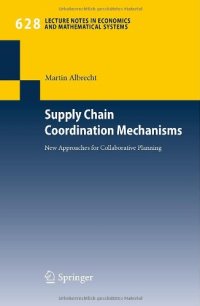
Ebook: Supply Chain Coordination Mechanisms: New Approaches for Collaborative Planning
Author: Martin Albrecht (auth.)
- Genre: Business // Logistics
- Tags: Production/Logistics
- Series: Lecture Notes in Economics and Mathematical Systems 628
- Year: 2010
- Publisher: Springer-Verlag Berlin Heidelberg
- Edition: 1
- Language: English
- pdf
Integrated supply chain planning is well understood by theory and widely applied in practice – however, only with respect to intra-organisational supply chains. In inter-organisational supply chains, an additional, yet unresolved problem arises: due to confidentiality reasons, decentralized parties keep their local data private, which prevents an integrated planning. Local planning procedures such as upstream planning, which are usually applied then, result in suboptimal solutions for the supply chain as a whole.
In this work, new mechanisms for inter-organizational, collaborative supply chain planning are presented. These mechanisms are able to identify the systemwide optimum for several classes of supply chain planning problems. They can be applied by two or more self-interested parties and do not require a trusted third party. Extensive computational tests for randomly generated and real-word data suggest a favorable performance of these mechanisms.
Integrated supply chain planning is well understood by theory and widely applied in practice – however, only with respect to intra-organisational supply chains. In inter-organisational supply chains, an additional, yet unresolved problem arises: due to confidentiality reasons, decentralized parties keep their local data private, which prevents an integrated planning. Local planning procedures such as upstream planning, which are usually applied then, result in suboptimal solutions for the supply chain as a whole. In this work, new mechanisms for inter-organizational, collaborative supply chain planning are presented. These mechanisms are able to identify the systemwide optimum for several classes of supply chain planning problems. They can be applied by two or more self-interested parties and do not require a trusted third party. Extensive computational tests for randomly generated and real-word data suggest a favorable performance of these mechanisms.